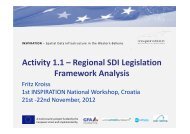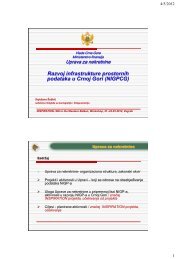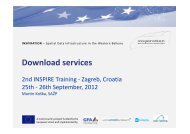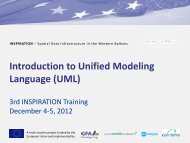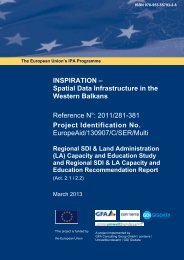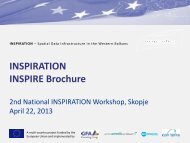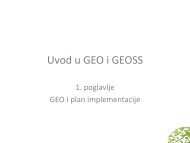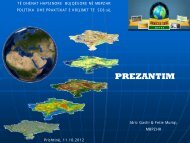MOVE - Moderation and Visualization for Group ... - INSPIRATION
MOVE - Moderation and Visualization for Group ... - INSPIRATION
MOVE - Moderation and Visualization for Group ... - INSPIRATION
Create successful ePaper yourself
Turn your PDF publications into a flip-book with our unique Google optimized e-Paper software.
Sharing Sharing Results<br />
Results<br />
The results generated during the previous<br />
working group sessions are presented, discussed,<br />
<strong>and</strong> commented in plenary. This provides<br />
feedback <strong>and</strong> an overview. In a further step,<br />
participants often may rate or appraise the<br />
conclusions they arrived at, <strong>and</strong> they may want to<br />
decide on how to proceed with those results.<br />
Implementation Implementation <strong>and</strong> <strong>and</strong> E EEvaluation<br />
E valuation<br />
Towards the end of a moderation cycle, the<br />
shared results should be integrated. Recommendations<br />
are <strong>for</strong>mulated, or an action plan is<br />
drafted. At mid-term <strong>and</strong> at the end of training<br />
events, it should be evaluated whether learning<br />
objectives were met, expectations achieved <strong>and</strong><br />
skills advanced. The transfer of learning refers to<br />
the fundamental question “How can participants<br />
apply their newly acquired learning results <strong>and</strong><br />
experiences at work?”<br />
The entity of the four phases makes <strong>for</strong> the shifts<br />
between action <strong>and</strong> reflection, <strong>and</strong> group work<br />
<strong>and</strong> plenary work that are so typical <strong>for</strong> moderated<br />
<strong>and</strong> visualized learning or planning processes.<br />
These shifts are part of what, later in this<br />
Part, is called ‘dramaturgic competence.’ Below,<br />
the four phases of the moderation cycle are<br />
outlined in greater detail.<br />
38<br />
Phase Phase 1 1 – – Orientation<br />
Orientation<br />
A good start into a group event will predetermine<br />
its course <strong>and</strong> eventual success. The way you<br />
create the first day of a workshop or training<br />
course will set the stage, atmosphere, <strong>and</strong> tempo<br />
– cognitively, affectively, <strong>and</strong> practically. Particularly<br />
<strong>for</strong> groups not yet familiar with <strong>MOVE</strong>, you<br />
should facilitate a conducive learning environment<br />
up-front <strong>and</strong> let participants learn the new<br />
method by doing: Working in groups <strong>and</strong> teams,<br />
putting dialogue over debates, sharing experiences,<br />
results, <strong>and</strong> responsibilities.<br />
There are three fundamental questions which<br />
each event should clarify first:<br />
WHO WHO are we?<br />
t What is our personal <strong>and</strong> institutional<br />
environment?<br />
t What are our fears, expectations <strong>and</strong><br />
motivations?<br />
WHA WHAT WHA are we going to do?<br />
t What are our learning or planning<br />
objectives?<br />
t What are the issues <strong>and</strong> problems we<br />
will discuss, <strong>and</strong> what are their<br />
respective contexts?<br />
t What can we possibly achieve in the<br />
course of the event?<br />
HOW HOW are we going to work?<br />
t How shall we proceed?<br />
t What are the ‘rules of the game?’<br />
The first sessions usually set the stage <strong>for</strong> the<br />
training event, <strong>and</strong> often follow a st<strong>and</strong>ard<br />
number of steps:<br />
■ Introduction of participants <strong>and</strong> team<br />
■ Introduction of workshop objectives<br />
<strong>and</strong> contents<br />
■ Participants’ expectations <strong>and</strong> fears<br />
■ Introduction of working principles<br />
<strong>and</strong> methods<br />
Other, more logistical aspects of the event’s<br />
initial stage such as invitation, first <strong>and</strong> second<br />
planning meeting of the moderation team,<br />
opening etc. are dealt with in Part 5.



